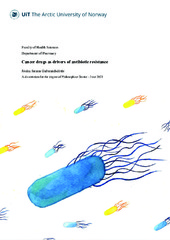| dc.contributor.advisor | Johnsen, Pål | |
| dc.contributor.author | Guðmundsdóttir, Jónína | |
| dc.date.accessioned | 2023-08-28T12:22:44Z | |
| dc.date.available | 2023-08-28T12:22:44Z | |
| dc.date.issued | 2023-09-15 | |
| dc.description.abstract | Antibiotics are the cornerstone for modern medicine, and their introduction into clinical use has made common medical procedures such as surgeries and cancer chemotherapy possible. The consequences of antimicrobial resistance (AMR), if it continues to rise on a global scale at its current speed, are expected to be staggering. It is well-known that antibiotics drive the evolution and spread of AMR, but the extent to which non-antibiotic drugs can do the same remains largely unknown.
In this thesis, I have investigated whether drugs used in cancer therapy may drive AMR evolution in the common gut bacteria Escherichia coli. I screened a panel of 73 oncology compounds against 11 common AMR mechanisms, looking for combinations where expressing AMR gives bacteria fitness advantages in the presence of antineoplastic agents. Of the 23 strongest combinations identified in the screen, an in-depth study looking into the effects on bacterial evolution and the underlying molecular mechanisms has been conducted for one agent. I show that the widely used cytotoxic drug methotrexate (MTX), used both in the treatment of cancer as well as for many autoimmune diseases, can not only cause high-level trimethoprim (TMP) resistance at a wide range of concentrations. Furthermore, I have demonstrated that selection for TMP resistance takes place at MTX concentrations well below the concentrations known to inhibit growth. This is especially problematic when TMP resistance is plasmid-mediated, as MTX exposure will then select for practically any AMR determinant co-expressed on the same plasmid.
With this work, we provide valuable insights into the effects that drugs used in cancer chemotherapy have on AMR evolution. A better understanding of the drivers of resistance, especially those directly affecting vulnerable patient groups, is essential if we hope to curb the spread and evolution of AMR. | en_US |
| dc.description.doctoraltype | ph.d. | en_US |
| dc.description.popularabstract | The aim of the thesis has been to look at how drugs used in cancer chemotherapy affect bacteria, more precisely, if they can cause antimicrobioal resistance (AMR) in the gut bacteria Escherichia coli. I have used classical approaches from the field of microbial evolution to look at if cancer drugs can cause AMR and/or if AMR bacteria grow better in the presence of cancer drugs than normal bacteria. I show with my work that this is indeed the case and have identified multiple cancer drugs that may drive AMR evolution. For the common cancer drug methotrexate (MTX) I have looked deeper into which mechanisms are at play and shown how MTX can cause, and select for, resistance towards the antibiotic trimethoprim. As the results suggest that cancer drugs may be affecting the evolution of AMR at concentrations estimated to be found in the gut during cancer treatment, they indicate a potential complication for patients undergoing chemotherapy. | en_US |
| dc.identifier.uri | https://hdl.handle.net/10037/30482 | |
| dc.language.iso | eng | en_US |
| dc.publisher | UiT The Arctic University of Norway | en_US |
| dc.publisher | UiT Norges arktiske universitet | en_US |
| dc.relation.haspart | <p>Paper I: Guðmundsdóttir, J.S., Fredheim, E.G.A., Koumans, C.I.M., Hegstad, J., Tang, P., Andersson, D.I., Samuelsen, Ø. & Johnsen, P.J. (2021). The chemotherapeutic drug methotrexate selects for antibiotic resistance. <i>eBioMedicine, 74</i>, 103742. Also available in Munin at <a href=https://hdl.handle.net/10037/23821>https://hdl.handle.net/10037/23821</a>.
<p>Paper II: Guðmundsdóttir, J.S., Hansen, J.U., Samuelsen, Ø. & Johnsen, P.J. Maintenance of a multidrug resistance plasmid in NMRI mice exposed to methotrexate: a pilot study. (Manuscript).
<p>Paper III: Guðmundsdóttir, J.S., Gama, J.A., Fredheim, E.G.A., Harms, K., Samuelsen, Ø. & Johnsen, P.J. Antineoplastic drug selection for antimicrobial resistance. (Manuscript). | en_US |
| dc.rights.accessRights | openAccess | en_US |
| dc.rights.holder | Copyright 2023 The Author(s) | |
| dc.rights.uri | https://creativecommons.org/licenses/by-nc-sa/4.0 | en_US |
| dc.rights | Attribution-NonCommercial-ShareAlike 4.0 International (CC BY-NC-SA 4.0) | en_US |
| dc.subject | VDP::Medisinske Fag: 700::Basale medisinske, odontologiske og veterinærmedisinske fag: 710::Medisinsk mikrobiologi: 715 | en_US |
| dc.subject | VDP::Medical disciplines: 700::Basic medical, dental and veterinary science disciplines: 710::Medical microbiology: 715 | en_US |
| dc.title | Cancer drugs as drivers of antibiotic resistance | en_US |
| dc.type | Doctoral thesis | en_US |
| dc.type | Doktorgradsavhandling | en_US |


 English
English norsk
norsk

